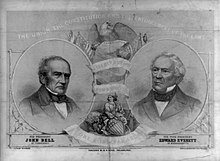Constitutional Union Party

The Constitutional Union Party ("constitutional" = English: constitutional, legal) was a political party in the USA . It was founded by former members of the Whigs , Know-Nothings and some Southern Democrats before the US presidential election of 1860 .
founding
The Constitutional Union Party (CUP) was founded in May 1860. At its founding convention they nominated the slave owner John Bell of Tennessee as president and Edward Everett , a former Whig, as Vice President for the presidential election in the fall 1860th
According to her political view, the impending secession of the northern and southern states was most likely to be averted by not taking any political position on the issues that divide the north and south of the USA (see: Causes of the Civil War ). Therefore, John Bell evaded the crucial question of the territorial limitation of slavery in the election campaign . Instead, he invoked the unity of the United States and condemned secessionists on both sides. According to the party, a split should, if necessary, be prevented with military pressure.
For this reason, instead of an election program, a resolution was issued that vowed not to recognize any other political principle than the constitution , the union and the observance of the law ("the constitution of the country, the union of the states and the enforcement of the laws" ). This attitude has been criticized by their political opponents. By these the CUP was accused of "offending the intelligentsia of the people by trying to build a party to ignore the slave question. This problem needs to be dealt with and clarified. "
The 1860 presidential election
The CUP did not expect to win the 1860 presidential election. What she could hope for, however, was to gain a majority in several northern states and thereby weaken the Republican presidential candidate Abraham Lincoln to such an extent that he would be denied a majority in the north. This in turn would have benefited the candidate of the Southern Democrats, John C. Breckinridge , who could assume to win a majority in the south. The CUP's hope was that if no candidate achieved the absolute majority it needed , the presidency would move to the House of Representatives . In such a case, the House of Representatives would elect the president from the three candidates with the most votes. Then, with enough influence in the House of Representatives, the CUP would have had a chance to help John Bell to victory.
The CUP was thus a so-called "third party". These were often founded for tactical reasons, such as to prevent the election of an unloved presidential candidate. As soon as this goal was achieved, the party that was originally intended to be short-lived was usually dissolved again. Many members then mostly joined other parties or took part in the establishment of new third parties.
It was similar with the split in the Southern Democrats in 1860, who nominated John C. Breckinridge in the elections, while the Northern Democrats were Stephen A. Douglas . Seen in this light, the creation of the CUP can be seen as an unsuccessful attempt to save US unity through a bipartisan alliance.
John Bell got less than three percent of the northern electorate and did not take a single northern state from Abraham Lincoln. In the states of Virginia , Kentucky and Tennessee, however, he achieved the majority of the votes. He won a total of 13% as he received 39% of the southern vote. The majority of the votes received came from the segment of the business elite that had previously voted for the Whig Party. They absolutely wanted to prevent the looming civil war.
After 1860
The party, founded with a view to the presidential election in 1860, to prevent a split in the United States and especially the civil war that was soon to break out, disbanded after the election. John Bell and other party members supported the Southern Confederate in the Civil War, while others supported the Northern Union. In 1861 former Constitutional Unionists were involved in the so-called Wheeling Convention , in which the establishment of the state of West Virginia was decided. In Missouri , which, despite professing slavery, did not join the southern states during the war, many party members joined the newly formed Unconditional Union Party . Here they supported the election of Claiborne Fox Jackson as governor of Missouri.
See also
Notes and sources
- ↑ Klumpjan, Helmut: The American parties. From the beginning to the present, p. 189.
- ↑ Quotation after ibid. P. 189.
- ↑ Quoted from McPherson, James Munro: Die für die Freiheit. The History of the American Civil War, p. 211.
- ↑ Klumpjan, Helmut, p. 188.
- ↑ Ibid. P. 189.
literature
- Klumpjan, Helmut: The American parties. From the beginning to the present; Opladen 1998, ISBN 3810011568 .
- McPherson, James Munro : Die for Freedom. The History of the American Civil War; Munich 2000, ISBN 3471781781 .